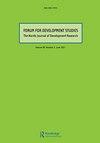石油和天然气勘探对尼日利亚东部奥波罗生计的环境影响:探索人民获得公平补偿的权利
IF 1.1
Q3 DEVELOPMENT STUDIES
引用次数: 3
摘要
摘要本文探讨了油气公司对其石油勘探所造成的损害的补偿是否足够。该研究广泛基于对尼日利亚河流州东部Obolo产油区当地接待社区的初步实地调查,借鉴了31位社区负责人、首席渔民、青年领袖、东部Obolo社区关系委员会(CRC)主席、最高酋长和副酋长以及石油公司社区关系经理的经验和看法。参与者的平均年龄为37岁。半结构化访谈采用深度访谈技术与关键信息提供者进行,以收集所需数据。我们的研究结果表明,分配正义和程序正义以及人们的自决权和公平补偿权在政策举措中受到损害。尽管规范赔偿的法律框架所固有的挑战超出了社会和环境治理的影响,但协调包括社会和环境保护执法在内的关键法律层面必须仍然是一个优先事项。本文章由计算机程序翻译,如有差异,请以英文原文为准。
Environmental Impact of Oil and Gas Exploration on Livelihoods in Nigeria’s Eastern Obolo: Exploring the People's Rights to Fair Compensation
Abstract This paper explores how adequate are oil and gas companies to compensate the damage done by their oil exploration. The study is based extensively on primary fieldwork in local host communities in the oil-producing areas of Eastern Obolo in Rivers State, Nigeria drawing on the experiences and perceptions of 31 community heads, Chief fishermen, youth leaders, the chairman of the Eastern Obolo Community Relations Committee (CRC), the paramount chief and sub-chiefs, and Community Relations Managers of Oil Companies. The average age of participants was 37 years. Semi-structured interviews were conducted with key informants using in-depth interview techniques to gather the needed data. Our results show that distributive and procedural justice and people’s rights to self-determination and fair compensation have been compromised in policy initiatives. Harmonising layers of critical laws, including the enforcement of social and environmental protection, must remain a priority though challenges inherent in the legal framework regulating compensation go beyond the impacts of social and environmental governance.
求助全文
通过发布文献求助,成功后即可免费获取论文全文。
去求助
来源期刊

FORUM FOR DEVELOPMENT STUDIES
DEVELOPMENT STUDIES-
CiteScore
1.80
自引率
14.30%
发文量
24
期刊介绍:
Forum for Development Studies was established in 1974, and soon became the leading Norwegian journal for development research. While this position has been consolidated, Forum has gradually become an international journal, with its main constituency in the Nordic countries. The journal is owned by the Norwegian Institute of International Affairs (NUPI) and the Norwegian Association for Development Research. Forum aims to be a platform for development research broadly defined – including the social sciences, economics, history and law. All articles are double-blind peer-reviewed. In order to maintain the journal as a meeting place for different disciplines, we encourage authors to communicate across disciplinary boundaries. Contributions that limit the use of exclusive terminology and frame the questions explored in ways that are accessible to the whole range of the Journal''s readership will be given priority.
 求助内容:
求助内容: 应助结果提醒方式:
应助结果提醒方式:


